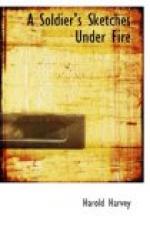Here is a “traverse” in a trench. The sergeant is reading the orders of the day to one of his men. This was a very damp corner—on the top of the dug-out to the left tunics were hanging to dry in the early morning air. The soldier still has on his sleeping cap (like the figure in the last picture); his mess-tin is by his side, and his rifle, encased in a waterproof cover. He is sitting on the firing platform, and the depth of the trench is noticeable, showing how low the men are in the ground. The sandbags shown it took us four hours one night to place in position. As fast as we put them up they were shot down again by the enemy’s maxim fire. We were all so tired and sleepy that, working on automatically, we hardly knew whether we were putting the mud in the sandbags or outside them.
It was not only the dampness and the incessant maxim fire we had to contend with here, but an army of insects, which jumped about us in battalions, and saw to it we were never lonely. A Cockney member of our company, after catching a particularly active jumper, called out: “Now then, you blighter, where is your respirator?”
The enemy were only thirty yards away, and we could often hear them shouting at us and would answer back. Many of our men were hit by snipers, while the shelling was often terrific, but we stuck on, as we were holding a part of an important military position. I remember how on an occasion when the shelling was very heavy one man engaged himself in making soup as coolly as if nothing was happening until the earth knocked up by the shells began to drop into the mess-tin, when he gave us his opinion of the Boches in his own forcible vernacular. We often laid for hours at the bottom of the trench—flat on the ground in the water and mud to escape the shells.
THE BIRTH-PLACE OF A SONG.
[Illustration: The birth-place of A song.]
The third bit of trench of this chapter has a claim to fame as the birth-place of a song. The song was one which only British soldiers could have concocted, and none but British soldiers would have sung. It had no known author and no known composer. It sort of “growed,” like Topsy. If it had had a title given to it I suppose it would have been called “I want to go home,” for that was its dirge-like refrain, always sung very cheerfully indeed, or with mock earnestness. Time and again I heard its chorus taken up with terrific gusto from end to end of this trench, and the whole extraordinary composition spread to other trenches like a contagion. Its popularity was instant and enduring—and as unaccountable as the popularity of many other popular songs. I think I quote the inspired words of the chorus correctly:—
“I want to go home,
I want to go home—
Tho’ the Jack Johnsons
and shrapnel
May whistle and roar,
I don’t want to go in
the trenches no more;
I want to be
Where the Alleymonds can’t
catch me:
Oh my!
I don’t want to die—
I want—to go home.”




